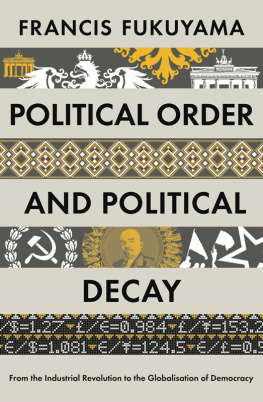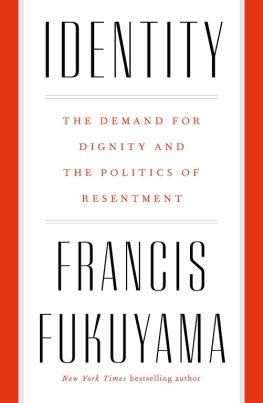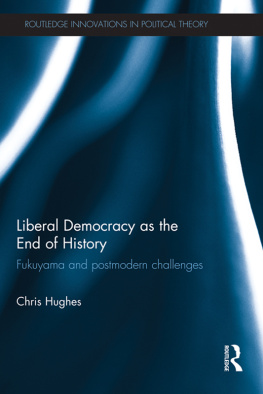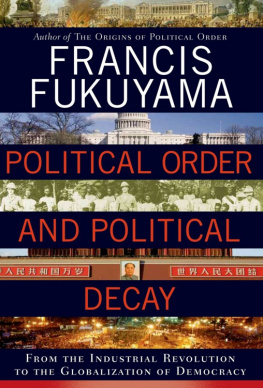POLITICAL ORDER
AND
POLITICAL DECAY
FRANCIS FUKUYAMA is the author of The Origins of Political Order, The End of History and the Last Man, The Great Disruption, Our Posthuman Future, State Building and After the Neocons. All have been hugely influential international bestsellers, translated and published in many languages. Fukuyama is in constant demand around the world in the media and as a speaker. He is Olivier Nomellini Senior Fellow at the Freeman Spogli Institute for International Studies, Stanford.
ALSO BY FRANCIS FUKUYAMA
The Origins of Political Order:
From Prehuman Times to the French Revolution
America at the Crossroads:
Democracy, Power, and the Neoconservative Legacy
State- Building:
Governance and World Order in the Twenty- first Century
Our Posthuman Future:
Consequences of the Biotechnology Revolution
The Great Disruption:
Human Nature and the Reconstitution of Social Order
Trust: The Social Virtues and the Creation of Prosperity
The End of History and the Last Man
POLITICAL ORDER
AND
POLITICAL DECAY
From the
Industrial Revolution
to the
Globalization of Democracy
FRANCIS FUKUYAMA

First published in Great Britain in 2014 by
PROFILE BOOKS LTD
3A Exmouth House
Pine Street
London EC1R 0JH
www.profilebooks.com
First published in the United States of America in 2014 by
Farrar, Straus and Giroux
Copyright Francis Fukuyama, 2014
1 3 5 7 9 10 8 6 4 2
The moral right of the author has been asserted.
All rights reserved. Without limiting the rights under copyright reserved above, no part of this publication may be reproduced, stored or introduced into a retrieval system, or transmitted, in any form or by any means (electronic, mechanical, photocopying, recording or otherwise), without the prior written permission of both the copyright owner and the publisher of this book.
A CIP catalogue record for this book is available from the British Library.
eISBN 978 1 84765 872 2
Energy in the Executive is a leading character in the definition of good government. It is essential to the protection of the community against foreign attacks; it is not less essential to the steady administration of the laws A feeble execution is but another phrase for a bad execution; and a government ill executed, what ever it may be in theory, must be, in practice, a bad government.
ALEXANDER HAMILTON
The English race, consequently, has long and successfully studied the art of curbing executive powers to the constant neglect of the art of perfecting executive methods. It has exercised itself much more in controlling than energizing government. It has been more concerned to render government just and moderate than to make it facile, well-ordered and eff ective.
WOODROW WILSON
When an American thinks about the problem of government-building, he directs himself not to the creation of authority and the accumulation of power but rather the limitation of authority and the division of power.
SAMUEL P. HUNTINGTON
INTRODUCTION
Development of Political Institutions to the French Revolution
Consider a number of very different scenarios that have been playing out at the beginning of the second decade of the twenty-first century.
In Libya in 2013, a militia armed with a panoply of heavy weapons briefly kidnapped the countrys prime minister, Ali Zeidan, demanding that his government provide them with back pay. Another militia has shut down much of the countrys oil production, which is virtually the only source of export earnings. Other militias were earlier responsible for the killing of U.S. ambassador Christopher Stevens in Benghazi, and for shooting dozens of demonstrators in the capital, Tripoli, who protested their continuing occupation of the city.
These militias were formed in various parts of the country in opposition to Libyas longtime dictator, Muammar Qaddafi, whom they ousted, with significant help from NATO, in the first year of the Arab Spring in 2011. The protests against authoritarian governments that broke out that year not just in Libya but also in Tunisia, Egypt, Yemen, Syria, and other Arab countries were often propelled by demands for greater democracy. But two years later, democracy as it is practiced in Europe and North America seems like a distant dream. Libya since then has taken some tentative steps toward establishing a constituent assembly that would write a new constitution. But at the moment, its most fundamental problem is that it lacks a statethat is, a central authority that can exercise a monopoly of legitimate force over its territory to keep the peace and enforce the law.
In other parts of Africa, states claiming a monopoly of force exist on paper and are less chaotic than Libya. But they remain very weak. Radical Islamist groups, having been pushed out of South Asia and the Middle East, have been setting up shop in countries with weak governments such as Mali, Niger, Nigeria, and Somalia. The reason that this part of the world is so much poorer in terms of income, health, education, and the like than booming regions like East Asia can be traced directly to its lack of strong government institutions.
Over the same time period, a very different scenario was playing out in the United States with regard to its financial sector. The United States is in many ways at the opposite end of the political spectrum from post-Qaddafi Libya: it has a very large and well-institutionalized state, one that dates back more than two hundred years and draws on a deep well of democratic legitimacy. But that state is not working well, and its problems may be related to the fact that it is too institutionalized.
Prior to the financial crisis of 2008, there were nearly a dozen federal agencies with regulatory authority over financial institutions, as well as banking and insurance regulators in each of the fifty states. For all of this regulation, however, the U.S. government was nonetheless unaware of the looming subprime mortgage crisis, allowing the banks to take on excessive leverage and permitting the emergence of a huge shadow banking system built around derivatives that were far too complex to properly value. Some commentators have tried to blame the crisis exclusively on government-guaranteed mortgages from agencies like Fannie Mae and Freddie Mac, which did in fact contribute to the meltdown. But the private sector was a happy participant feeding the mortgage frenzy and could take undue risks because large banks knew that they would ultimately get bailed out by the government if they got into trouble. This is exactly the scenario that occurred in the wake of the Lehman Brothers bankruptcy in September 2008, leading to a near collapse of the global payment system and the deepest U.S. recession since the Great Depression.
What is perhaps more shocking, however, is what has happened since the crisis. Despite widespread recognition of the enormous risk posed by too-big-to-fail banks, the American banking sector became even more concentrated than it was in 2008. In the years following the crisis, Congress passed the Dodd-Frank Act that was supposed to solve this problem. But the legislation ignored simpler remedies, such as sharply raising bank capital requirements or putting hard caps on the size of financial institutions, in favor of a highly complex stew of new regulations. Three years after passage of the legislation, many of those detailed rules had not yet been written and would likely not solve the underlying too-big-to-fail problem even if they were.
Next page








